The sixth China-Germany inter-governmental consultation was held via video link on April 28. Premier Li Keqiang and German Chancellor Angela Merkel held a small-range talk first, before holding another talk with 25 ministers from both sides.
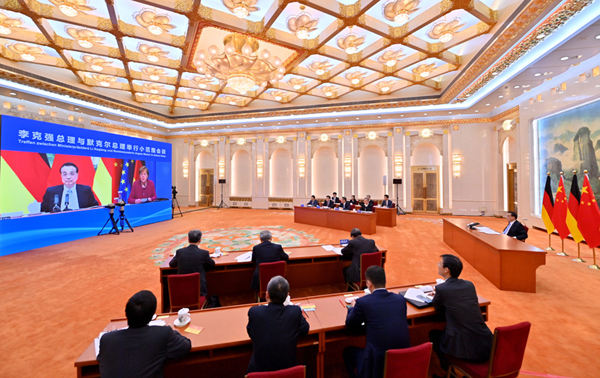
Ten years ago, Merkel proposed establishing a China-Germany inter-governmental consultation mechanism, the first of its kind for China to jointly build with other countries.
“As far as I know, Chancellor Merkel is the only government head who attended all six rounds of talks, and I highly appreciate it,” Premier Li said at the opening of the talks. “Over 10 years, the China-Germany inter-governmental consultation mechanism has served as a ‘super engine’ to significantly boost pragmatic cooperation between China and Germany in a wide range and great scale.”
“This round of China-Germany inter-governmental consultation has proved again the China-German cooperation has widened and deepened to a new level. Germany hopes the mechanism could continue to make new progress in various aspects,” Merkel said.
More cooperation to expand mutual benefit
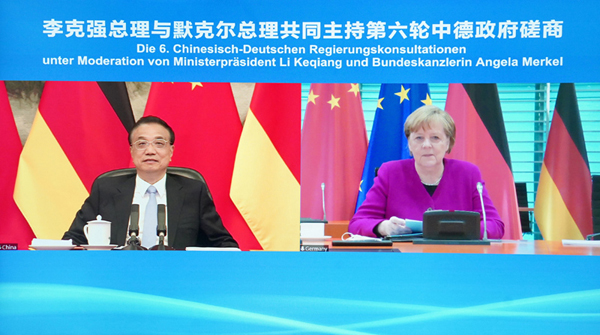
Premier Li and Merkel listened to work reports by heads of government departments from both sides on various sectors, including diplomacy, economy and trade, judicature, finance, industry, transportation, education, science and technology, public health, agriculture, environmental protection and social security.
Premier Li said the current international situation is complicated with the still-spreading epidemic, and protectionism still exists.
“Under such circumstances, it is all the more important for China and Germany to work together to expand common interests, seek common ground while shelving differences, and jointly send a positive signal to the world of upholding multilateralism, free trade and world peace,” Premier Li said.
He said China does not deny the two countries have different views on some issues.
“As long as the two sides respect each other's core interests and major concerns while communicating, building confidence, dispelling misgivings, narrowing differences and focusing on cooperation on the basis of treating each other as equals without interfering in each other's internal affairs, the two countries can create favorable conditions for the further smooth development of their dialogue and cooperation, and ensure the long-term healthy and stable development of bilateral relations,” Premier Li said.
Merkel said if the two countries have differences, they should face them head-on, speak openly and resolve them through dialogue and consultation, like today.
She said next year marks the 50th anniversary of the establishment of diplomatic ties between Germany and China. Germany is willing to deepen mutual trust and expand cooperation with China to further boost bilateral relations.
Openness preferred to isolation
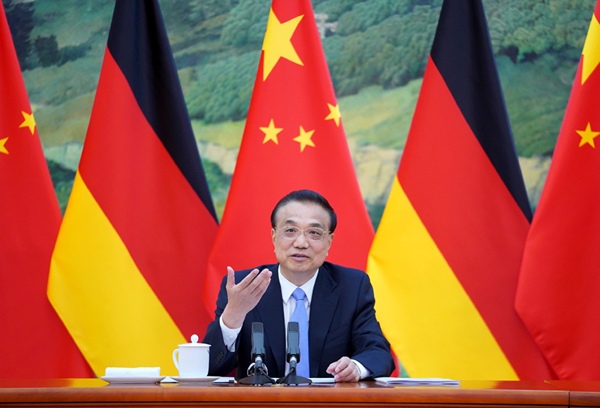
Premier Li said China and Germany should continue to expand two-way opening-up, promote free trade through opening-up and facilitate world economic recovery.
“China's opening-up and Germany's participation in the European integration process have proved both China and Germany are willing to embrace openness rather than isolation. Openness is beneficial to both sides,” said Premier Li.
“China will further open up to the outside world and is ready to share development opportunities with other countries including Germany. China is willing to work with the EU to jointly promote the early signing and launching of the China-EU Comprehensive Agreement on Investment and to facilitate the healthy and stable development of China-EU relations,” Premier Li added.
Merkel made it clear Germany does not want isolation. Instead, it stands for openness and cooperation and opposes protectionism.
She said the EU-China Comprehensive Agreement on Investment is of great significance to EU-China relations, and hoped the two sides could jointly promote entry into force of the agreement at an early date.
Solidarity solution to pandemic
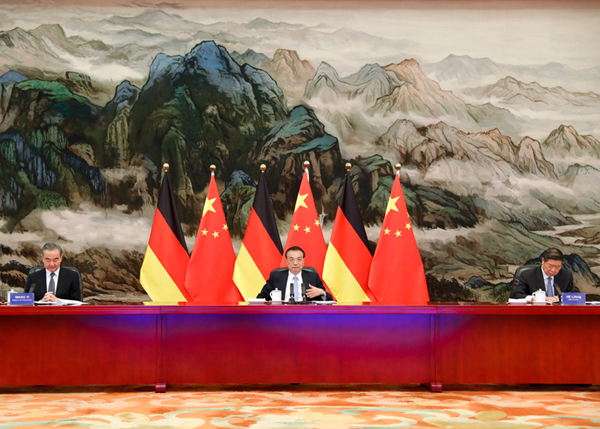
“No country can be immune from the pandemic, and only a united world can fight against the virus.” Premier Li said. “Under the current situation, China and Germany should strengthen cooperation in the fight against the pandemic, and work together to gradually restore international order.”
He said China advances fair and reasonable distribution of vaccines and opposes “vaccine nationalism”. He also suggested both sides make full use of China-Germany "fast tracks" to facilitate necessary personnel movement and maintain stability of global industrial and supply chains.
"At present, the main task facing human society is the fight against the pandemic," Merkel said, expressing hopes both sides would take full advantage of "fast tracks" between the two countries, for maintaining orderly personnel exchanges and promoting cooperation on production and mutual recognition of vaccines.
Scientists encouraged to explore freely
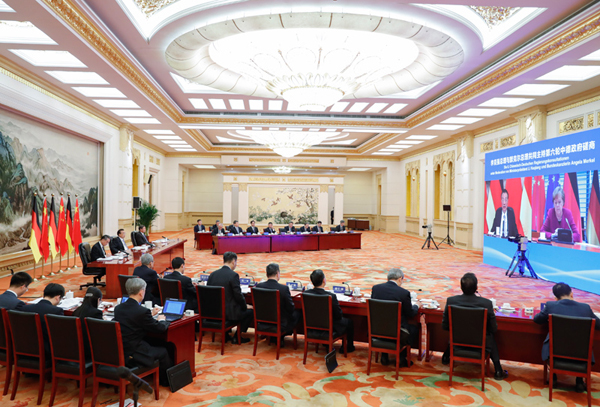
China and Germany should deepen scientific and technological cooperation to inject new impetus into the development of the two countries, according to Premier Li.
“Science has no borders. China has always advocated strengthening international cooperation in scientific research and promoting scientific and technological cooperation based on strict protection of intellectual property rights.” he said. “There should be no restrictions for scientific exploration, scientists should be encouraged to conduct free exploration and achievements of human civilization deserve respect.”
Premier Li said China and Germany have broad space for cooperation in many fields, including response to climate change, advanced manufacturing and modern service industry.
“Relevant departments of the two sides have had talks about this, hoping to get ready before the pandemic is over, so the pragmatic cooperation between China and Germany will continue to lead the world after the pandemic," he said.
Merkel responded by saying "the pragmatic results of this round of intergovernmental consultation between China and Germany have proven the cooperation between the two countries is not only in the economic and trade field, but also in science and technology as well as many other aspects, which is all-around".
Facing differences directly
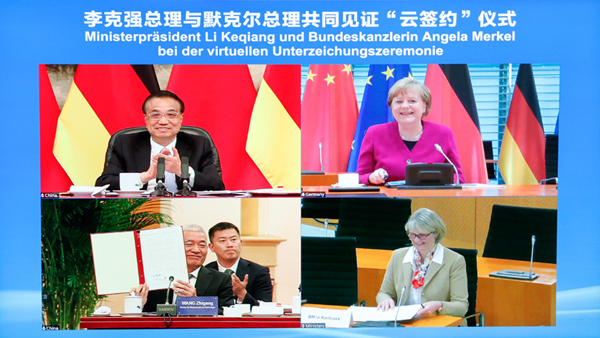
The consultation, which lasted nearly four hours, was deemed "a success with plentiful outcomes" by the two leaders just before conclusion.
"Instead of skirting around differences, we made abundant communication and reached more consensus during the dialogue, sending positive signals to the international community," Premier Li said.
Noting it has been 10 years since the establishment of the mechanism, he said he hopes this round of consultation could end successfully while forging a new beginning for further consultations.
"It will be the last time for me to take part in the China-Germany intergovernmental consultation," Merkel said. "It again manifested the breadth and depth of the bilateral cooperation, and I expect more results could be put in place."
After the consultation, the two leaders attended an online ceremony, witnessing the signing of seven documents on bilateral cooperation in fields including tackling climate change, social security, hygiene and health, food security, international development, transportation and sustainable development.